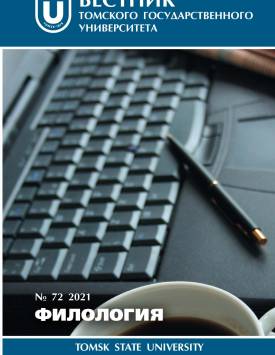Fyodor Dostoevsky in Walter Benjamin’s Assessment
The aim of the article is to discuss the reception of Fyodor Dostoevsky’s oeuvre by the German author Walter Benjamin. This reception, which has never been the subject of a special study, is analyzed on the basis of Benjamin’s texts which contain references to Dostoevsky. Among them are articles and fragments devoted exclusively to Dostoevsky as well as allusions to him in other Benjamin’s works. Based on a literary analysis of the original sources, three stages in the development of Benjamin’s attitude towards Dostoevsky were identified. The first stage covers the late 1910s - early 1920s and includes an early essay on Dostoevsky’s The Idiot accompanied by other texts concerned with issues of youth, childhood, and immortality which were crucial for the young Benjamin. The first period can be described in cultural and philosophical terms of the “fin du siecle” with its focus on secularization of universal religious and metaphysical concepts, as it was expressed in Benjamin’s early works including those dedicated to Dostoevsky. The young Benjamin views Dostoevsky primarily within the framework of German classical and romantic literature (Goethe, Holderlin, Jena Romanticism). The second stage (late 1920s - early 1930s) is characterized by Benjamin’s continuing departing from universalist interpretations of Dostoevsky. Within his own concept of “anthropological nihilism”, Benjamin begins to see Dostoevsky as more of a particularist and heretical author with strong modernist traits. A significant role in this change played Benjamin’s fascination with French surrealism, about which he wrote a number of articles since the second half of the 1920s. The last stage, which begins in 1933 and ends with Benjamin’s death in 1940, is marked by his increased interest both in general sociological aspects of literature and Dostoevsky’s art of novel and narration. This final turn was caused, inter alia, by Leo Lowenthal’s essay on the reception of Dostoevsky in pre-World War I Germany (1934), in which Lowenthal linked Dostoevsky both with reactionary attitudes of the German middle class and the ideas of psychoanalysis. All in all, Benjamin’s dynamics of reading and assessing Dostoevsky were driven by his personal intellectual evolution, which unfolded within the framework of Western European philosophical, cultural, and artistic tradition of modernism. At the same time, Benjamin’s reflections on Dostoevsky’s experimental, modernist poetics and the antipsychological character of his novels may remind us of similar trends in Russian and Soviet studies on Dostoevsky in the 1910s-1920s (Bakhtin, Komarovich). Dostoevsky’s realism went through a series of intellectual transformations in Benjamin, starting with the philosophical universalism of his early works rooted in the German intellectual tradition and ending with the inclusion of the Russian writer in the new international canon of modernist poetics of the twentieth century.
Keywords
Walter Benjamin, Fyodor Dostoevsky, The Idiot, Demons, youth, poetics of novel, modernism, psychoanalysisAuthors
| Name | Organization | |
| Erokhin Alexander V. | Kalashnikov Izhevsk State Technical University | erochin@yandex.ru |
References

Fyodor Dostoevsky in Walter Benjamin’s Assessment | Vestnik Tomskogo gosudarstvennogo universiteta. Filologiya – Tomsk State University Journal of Philology. 2021. № 72. DOI: 10.17223/19986645/72/11
